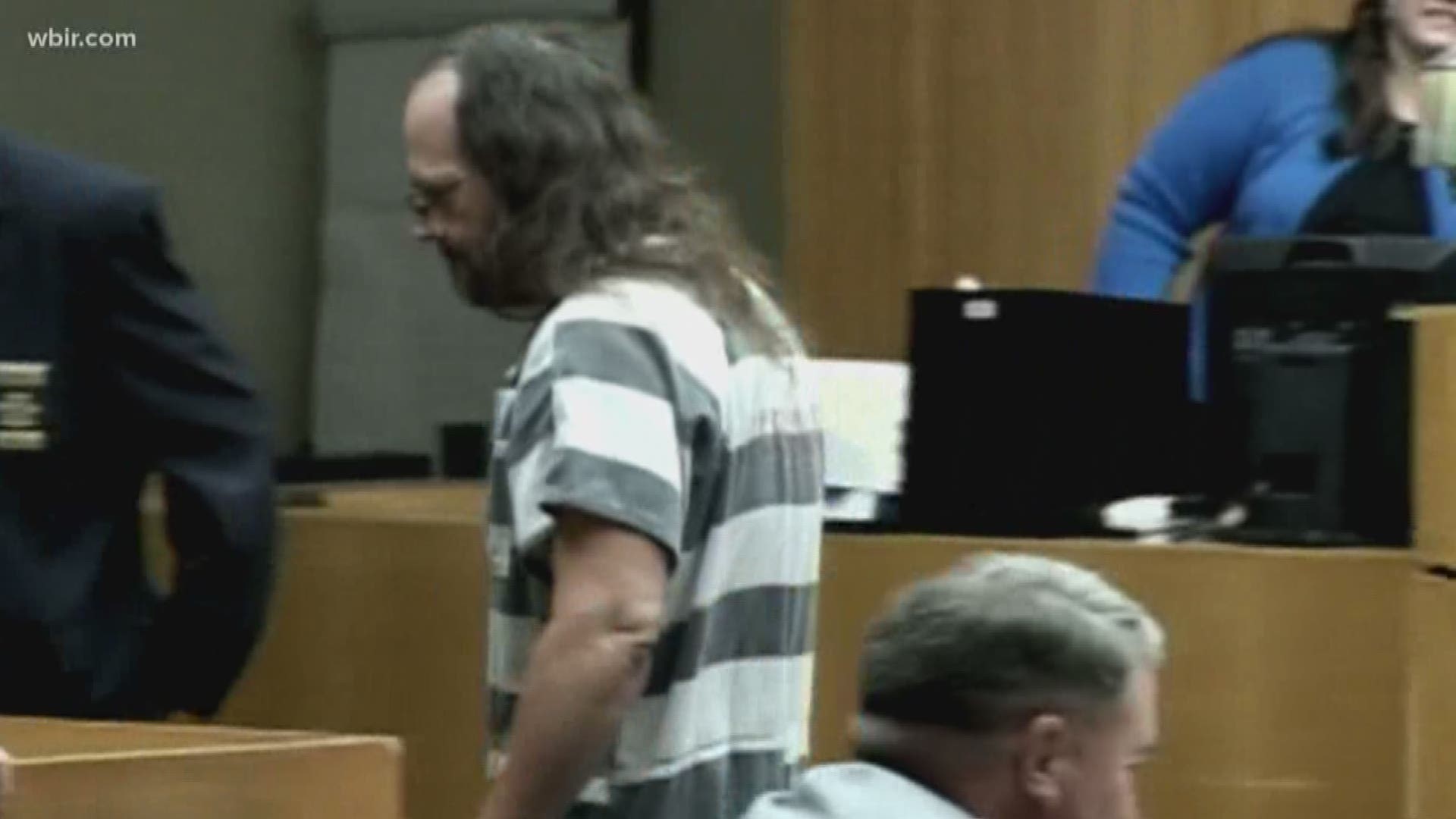There is no chance a condemned man's challenge of the state's lethal injection method will succeed, so the Tennessee Supreme Court should not hear his legal appeal or delay his impending execution, the Tennessee attorney general argued in a legal filing Thursday.
The filing comes in response to Billy Ray Irick's request earlier this week that the high court delay his execution -- set for Aug. 9 -- until it takes up a constitutional challenge of the three-drug method Tennessee wants to use to kill him.
It now falls on the state Supreme Court to decide if it wants to delay Irick's death and hear his appeal, or side with the state and let his execution proceed.
Irick, 59, was convicted in 1986 of the rape and murder of 7-year-old Paula Dyer in Knox County. The attorney general notes Irick's crime several times in its filing.
"The jury convicted Irick of the first-degree-murder and aggravated rape of a 7-year-old child…Now, 32-years later, there is no reason not to permit the State of Tennessee to ‘execute its moral judgment in (this) case’ and to provide justice to the victims of Irick’s crimes," Attorney General Herbert Slatery argues in his filing.
Irick has exhausted his appeals on his own case, but he may receive a stay of execution as soon as Friday. He requested the Tennessee Supreme Court delay his death sentence earlier this week; Irick is one of 33 death row inmates challenging the constitutionality of Tennessee's lethal injection method.
The inmates lost a local trial challenging the method, but they plan to appeal the case. No court could hear the appeal before Irick's scheduled execution.
The attorney general argues the inmates have no shot of winning on appeal, and are simply trying to delay executions.
“Successive delays in the execution of a lawful death sentence while condemned inmates raise endless challenges to discrete components of Tennessee’s execution protocol undermine the validity of criminal judgments and deny justice to the victims of the state’s most morally offensive crimes,” the filing states.
The filing makes no mention of Irick's mental health, a potentially critical element that could stop Irick's execution.
It would be unconstitutional and immoral for Tennessee to execute a man with a documented history of severe mental illness, argue local and national advocacy organizations in a joint letter to Gov. Bill Haslam.
The letter, dated Wednesday, was sent by the leaders of the National Alliance on Mental Illness and the state's chapter of the organization. The leaders call on Haslam to commute the death sentence of Billy Ray Irick to life without parole.
"From all reports, Irick’s severe mental illness has continued unabated during his many years of incarceration. The fact that eight experts, working for both the state and the defense, agree that he suffers from severe mental illness is powerful evidence in support of this point," reads the letter written by NAMI CEO Mary T. Giliberti and NAMI-Tennessee Executive Director Jeff Fladen.
Analysis: Will Billy Ray Irick receive a stay of his Aug. 9 execution?
A psychiatrist who interviewed Irick during his trial determined the man did not suffer from mental illness. However, documents presented at subsequent legal proceedings show he started receiving treatment for mental illness as a young boy, including a commitment to a psychiatric hospital.
Following Irick's conviction, the family of the murdered 7-year-old girl — with whom Irick was living at the time of the crime — signed affidavits noting Irick was paranoid and was "talking to the devil."
After reviewing these documents, the psychiatrist from Irick's original hearing essentially retracted his findings.
Giliberti and Fladen note this determination was never considered during any of Irick's appeals.
"Therefore, accurate information concerning Irick’s mental state at the time of the crime was not presented at trial or sentencing, nor has it ever been heard of considered by any court," Giliberti and Fladen write.
"It is clear that the process of fairly evaluating the impact of mental illness as a mitigating factor did not occur."
The U.S. Supreme Court has ruled against executing juveniles and people with developmental disabilities. But it has not stopped the executions of the severely mentally ill.
If juveniles and people with developmental disabilities should not be held culpable for their actions in terms of the death penalty, Giliberti and Fladen argue neither should people with severe mental illness.
A Haslam spokeswoman said Thursday his office has not yet received the letter.
Haslam is reviewing Irick's clemency petition, and recently said he's taking Irick's mental health into account. He explained he would only decide to intervene in a capital punishment case if he thought the criminal justice system failed at some point leading up to the execution.
"It’s obviously not a pleasant part of my job, and there’s not a bit of it that I relish. I have a role to play, and that’s to make certain: Did the process fall apart somewhere along the line?" Haslam recently told reporters.
"My role, again, is not to be the 13th juror, it’s not to decide is capital punishment right or wrong — it’s the law of the state. My role is to say, did the process break down anywhere along the way?"
Earlier this week, a Haslam spokeswoman said the governor has not made a decision on Irick's case, and is monitoring ongoing legal proceedings that could delay the execution.
The letter comes the same day that Pope Francis formally pronounced the Catholic Church's opposition to capital punishment in any scenario. The Pope previously announced his intention to change the church's catechism in October, but the new text was published Thursday.
"The Church teaches, in the light of the Gospel, that 'the death penalty is inadmissible because it is an attack on the inviolability and dignity of the person', and she works with determination for its abolition worldwide," the new text reads, as reported by USA TODAY.

